More and more people are saying goodbye to the 9-5 day job… or at least, they would really like to. Entrepreneurship is becoming increasingly popular, and while there are certainly a lot of benefits that come with being your own boss, there can be some additional drawbacks, too.
Entrepreneurship has a lot of moving parts, and while some find it fulfilling, it isn’t the right choice for everyone. In last week’s #SEMrushchat, John Doherty joined us to discuss the advantages and disadvantages of self-employment. This is an area Doherty has a great deal of experience in, being the founder of both Credo and Single Geared, working as an entrepreneur in both B2B and B2C industries.
Check out what both John Doherty and other industry experts had to say when they discussed their experiences with entrepreneurship, and see if being your own boss is the right choice for you.
Q1. Are you an employee or self-employed? What is the biggest benefit of your current position?
There are definitely benefits to being self-employed, but sometimes you lose benefits of traditional employment in exchange. When you are considering entrepreneurship, it is important to look at the biggest benefits of both traditional employment and self-employment, so we asked our chat participants about the benefits of their current positions.
First, we will take a look at benefits of traditional employment, which includes a steady paycheck, job security, and (for many) benefits like insurance or employee-match 401Ks, and retirement plans. This kind of security-- which is enormous-- is something that many know that they waive when they jump ship to tackle self-employment, but what about the other small benefits?
A1 employee, biggest benefit is not worrying where my next paycheck is coming from. #semrushchat
— Hilary St Jonn (@HilaryStJonn) January 3, 2018
A1.) living that “company man” life. Stability and the resources to invest in the type of work I’m really interested in are pretty solid reasons to keep coming back. #semrushchat
— Ryan Glass (@RyanGPhx) January 3, 2018
Chat participants frequently mentioned being able to try new or innovative things without the risk. Whether this was due to employer-paid training or more leeway to take chances without it affecting them directly, traditionally employed chat participants noted that trying new things was a huge benefit. Others mentioned that since things like big-picture factors and resources (and, stability) were provided by their employer, they could focus on the parts of the job they loved. And, of course, you can’t forget the camaraderie and support that comes with working on a great team.
A1: I'm currently an employee, and the biggest benefit is leading the entire paid search department. I get to have a hands-on approach to creating our department strategy and processes. I feel like an entrepreneur minus the financial risks. #semrushchat
— Danny Ray Lima (@dannyraylima) January 3, 2018
A1) Employee. The biggest perk is being able to have a more in-depth feel of company values and culture. That is important to plan and execute plans. #semrushchat
— Montse Cano (@MontseCano) January 3, 2018
A1: Employee. I like it bc the details are covered by someone else, and I can focus on what I like to do (SEO). I've talked to other entrepreneurs who say their biggest struggle is that they get to do their "job" 30% of the time, and run their biz the other 70% #semrushchat
— Carolyn Lyden (@Carolyn_Lyden) January 3, 2018
So, what about the benefits of self-employment? The two biggest benefits are flexibility and control. Our entrepreneur chat participants mentioned benefits like the ability to work anywhere, or anytime. They would work from home in their yoga pants (dog at their feet) or work while traveling the world. The flexibility of being their own boss also allowed them to create the work that they wanted to be working on and to choose their own clients once they had reached a certain point in their careers. Some also mentioned the freedom to try new things and make mistakes, without being more restricted by a large corporation.
[A1] My favorite part of being self employed as well is setting own schedule, making my own choices, and controlling my own destiny. It's stressful, but it's fun! And I get to work from my home in my sweatpants. #semrushchat
— John Doherty ? (@dohertyjf) January 3, 2018
A1: I'm self-employed. The biggest benefit is to do what you want. Nobody tells you what to do. You can decide yourself based on your own preferences. #semrushchat https://t.co/xC5XyiurN1
— Tadeusz Szewczyk (Tad Chef) (@onreact_com) January 3, 2018
A1) I appreciate freedom to do what you want when you work for yourself is a biggie (it is of course), but I always still try to build processes into my time as though I were employed. Looking to grow things this yr & that won't be easy without clear processes #semrushchat
— Dawn Anderson (@dawnieando) January 3, 2018
The flexibility also came into play when self-employed workers were tackling projects with clients. They weren’t limited to iron-clad processes or checklists like they may have been at agencies or corporations before; they had more control over the situation and could tailor their solution to best fit the client. You can do what you want, how you want, though of course you still have to answer to the clients paying you.
A1. Independent consultant. I like the flexibility of creating solutions and processes that fit the client. #semrushchat
— Mariana Norton ? Digital Strategy Consultant (@MarianaNNorton) January 3, 2018
Self-employment is the ultimate high-risk, high-reward scenario. You give up certain guaranteed benefits like health insurance and a biweekly paycheck, but you get to be your own boss, and-- should things go well-- you could ultimately make much more than you could in traditional employment any day. That being said, as John Doherty mentions in his tweets, it is not right for everyone, but it will be pretty great for the people it is a good fit for.
[A1] FYI I'm not here to try to convince anyone to go work for themselves or not. You have to make the right choice for your personality and your life circumstances. But it can be fun! #semrushchat
— John Doherty ? (@dohertyjf) January 3, 2018
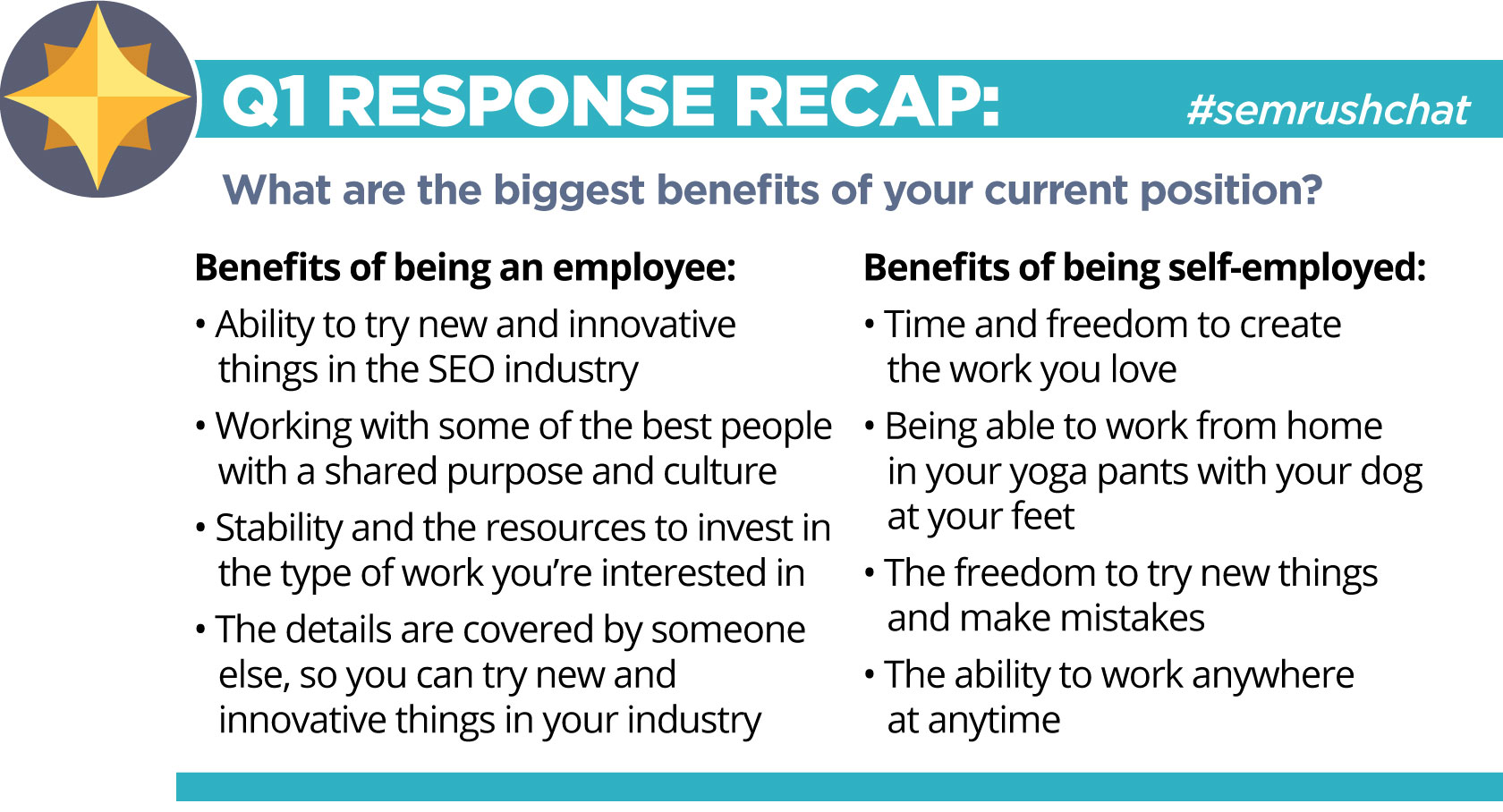
Q2. What are some benefits of running your own company, versus working for someone else? What are the disadvantages?
As with all types of entrepreneurship (and everything in life, really), there are both major benefits and drawbacks of running your own company.
“Freedom” was the one word our chat participants used more than any other when answering this question regarding the benefits of running your own company. They discussed the freedom to travel or not be tied to one place (or traditional office hours), especially those who did remote work like web development or consulting that could be done anywhere in the world. They mentioned the freedom to run your business exactly how you would like, without the red tape of corporations setting ridiculous rules that made no sense. It also provides the freedom to choose your schedule and to work at your own pace and set your standard.
A2: I think the benefit is setting the vision and culture of your business. But to me, the best interest of a business owner is being a mentor and leader to your employees. Giving them the tools and knowledge to help them get to where they want to go in their career. #semrushchat
— Danny Ray Lima (@dannyraylima) January 3, 2018
A2: I consider my company sort of "starter SEO" for small business owners who aren't willing to pay for the bigger campaigns. If I were self-employed, I would be excited to take on bigger ticket clients where I can do a lot more. #SEMrushchat
— Sarah Nelson (@Blogging_Geek) January 3, 2018
A2.) presumably your own company always stocks your favorite snacks. (think Rand joked about this on his hedonic treadmill post) #semrushchat
— Ryan Glass (@RyanGPhx) January 3, 2018
You also have the freedom to determine your profit. This can definitely be a disadvantage as well, as one participant pointed out, but you aren’t limited to a set agreed-upon income; you can work a few extra hours, or choose only high-paying projects, and increase your income significantly even in one month.
[A2] Honestly, my income has been greater and more stable since going to work for myself. That's been an unexpected plus! #semrushchat
— John Doherty ? (@dohertyjf) January 3, 2018
It is important to note, though, that while that freedom sounds incredible, there are major drawbacks to consider, too. While “freedom” is the buzzword for the advantages, “responsibility” was the most commonly used word for the disadvantages.
[A2] That said, there are very real challenges to running your own business. You're responsible for everything. You have to do everything - sales, marketing, fulfilling the work. If it's your first business, you'll have to learn how to build systems and a team. #semrushchat
— John Doherty ? (@dohertyjf) January 3, 2018
A2: Running your own company gives you complete freedom over how to do it. You can do everything at your own pace, standard, and style. That's also the disadvantage because you're responsible for everything. #semrushchat
— Kevin_Indig (@Kevin_Indig) January 3, 2018
The responsibility for everything falls back on you. You need to be choosing the right priorities, getting clients, paying bills, and tracking money. It is up to you to either know how to handle everything-- including complex matters like business taxes or law-- or to hire the right people to help you. You can get help, but only if you are paying others to do it, and at the end of the day, no one will care about your business as much as you. This can be isolating, especially if you are working online.
A2: Running your own company gives you more freedom and flexibility, especially with your schedule.
The downside is that everything depends on YOU. There's no one making sure you get things done. #semrushchat
— Express Writers (@ExpWriters) January 3, 2018
A2: Running your own shop may be taxing on you mentally, both by the limited amount of resources and the isolation. Being successful within digital means being open to conversations around tactics and best practice, which can be tougher if you're isolated. #semrushchat
— Sean Bucher (@spbucher) January 3, 2018
A2: The only thing I thought was a disadvantage to running my own thing was the time spent selling, billing, PMing, etc...outside of just delivering the goods. LOVE getting agency rates for it though. #semrushchat
— Matt Lacuesta (@MattLacuesta) January 3, 2018
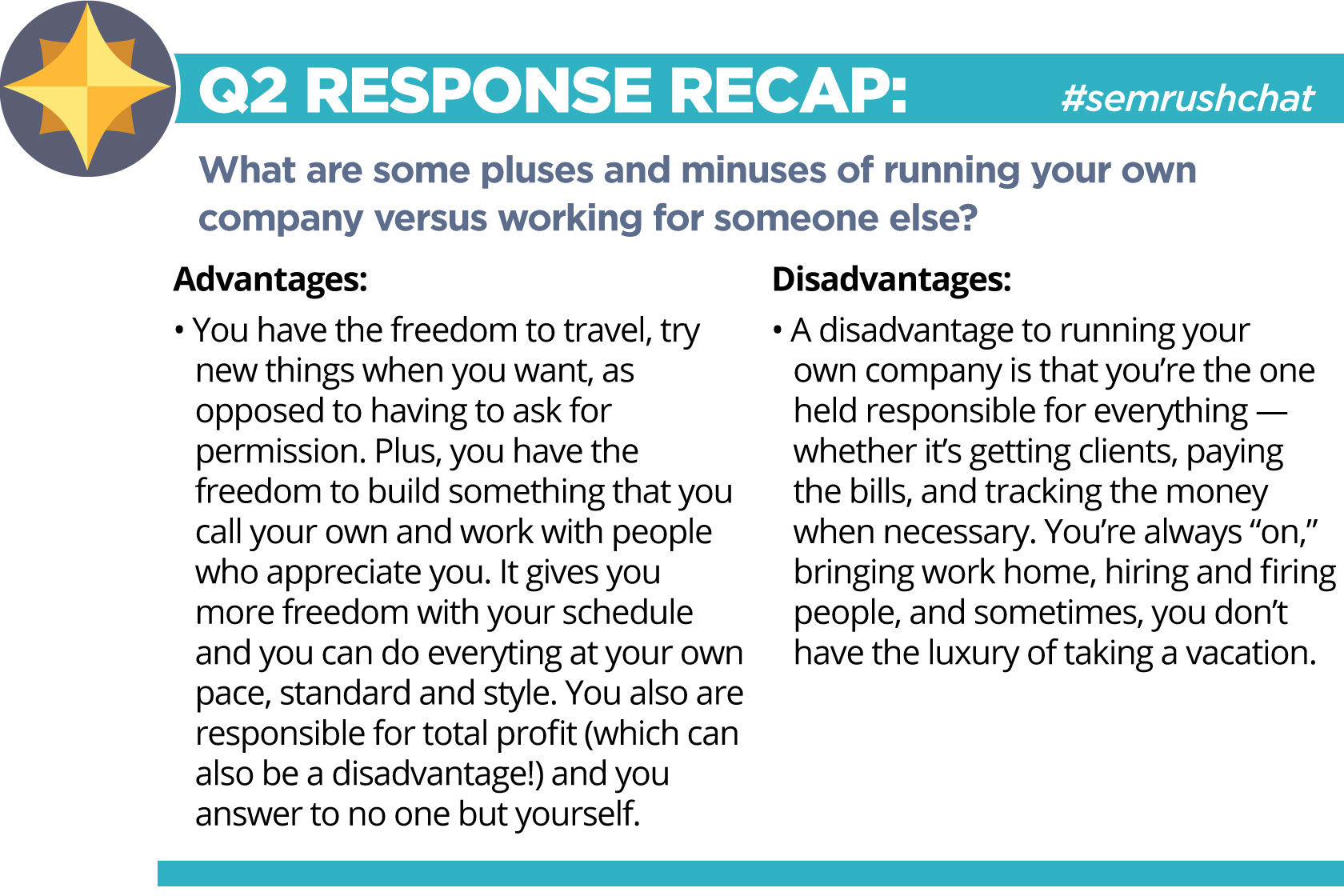
While the freedom to continue to increase your income is a great advantage, the downside is that you have to work a whole lot more to do this. This means that you may find yourself always “on,” bringing work home and finding it difficult to take vacations, or even weekends or a day off. This is especially true during the first few years when you are building a brand and establishing yourself in your field. If you take a sick day, after all, that is fine-- but your business stops for a day, and there is no such thing as sick pay. You can always make more money, but you can’t make more time, and this can be your biggest limitation.
A2. From my side hustle, it's opposite of the 'wage slave' part of my life. I find it *really* hard to know when to stop working on it; balancing the books/getting money in on time is tough; and finding all the time I need to do it as well as I'd like. #semrushchat
— Ⓞⓟⓣⓘⓜⓘⓢⓔⓨ (@Optimisey) January 3, 2018
Q3. What are the best ways to balance your current day job with your side business?
Some people choose to manage their business while still maintaining a day job for the security, giving them time to grow their business steadily while mitigating the risk. This is great for those who have the opportunity to do so, but it can be exceptionally difficult to balance.
[A3] Side businesses are not for everyone, but if you want to bootstrap then they're almost necessary. Before you step into entrepreneurship, you should have a clear path to replacing your main income, if not having it fully replaced already. #semrushchat
— John Doherty ? (@dohertyjf) January 3, 2018
[A3] Honestly, it's hard and I was very bad at it when I was employed and doing some side work. Depending on your life situation, it might not be possible to do work on the side. But, there are ways to build systems that let you have time for it. #semrushchat
— John Doherty ? (@dohertyjf) January 3, 2018
While it is definitely possible, you want to be careful while doing this. It can be exceptionally difficult, and it is so important to remember that. You risk burning yourself out and under-performing in both positions, sending you backward instead of pushing you forward. If possible, find someone that you trust to delegate tasks to. This may be an assistant or someone who you take on as a partner or an apprentice to train.
[A3] I got laid off and had to scramble to make it work. Luckily I did, and had also been wanting to go work for myself. But it was super scary, and I found a parachute on the way down. #semrushchat
— John Doherty ? (@dohertyjf) January 3, 2018
A3: Be aware of burning yourself out. Pass things along to someone you trust if you aren't going to be able to crush it. If you don't have someone you trust, I'm sure @dohertyjf can point you in the right direction. He knows people #semrushchat
— Matt Lacuesta (@MattLacuesta) January 3, 2018
A3: Set boundaries for yourself. Over-working is real and can have major consequences. Balance is key, so if you're finding yourself stretched too thin, roll-back on your side-gig, or bring on someone to help. #semrushchat
— Sean Bucher (@spbucher) January 3, 2018
A3: use an all-encompassing calendar and a weekly small task list for your side hustle. #semrushchat pic.twitter.com/YOAGrtiOHa
— Julie Lichtenberg (@jalichtenberg) January 3, 2018
A3: Not do any overtime in either! #semrushchat
— Natalia Witczyk (@witczyk) January 3, 2018
Setting boundaries will help you make the most out of the time you have without resulting in you completely overworking yourself. To do this, block time off to work on your business and your day job. Have set hours for both, and don’t let them overlap. You will work more hours overall than if you try to handle both jobs in the same time slots, but you will be endlessly more productive in both positions as a result.
A3: You have to learn to make the most of the time you have. Block off time to work on your business and stay dedicated even when things get tough. #semrushchat
— Express Writers (@ExpWriters) January 3, 2018
A3 This tip I got from @problogger about starting a blog. Just 30 minutes a day. Doing something regularly 30 minutes a day and build it up, but also give time to yourself! #SEMrushchat
Not sure that would work for freelancers though… :)
— Hilary St Jonn (@HilaryStJonn) January 3, 2018
A3: Have boundaries between the two. Have set hours to work on both and do your best not to let those hours overlap. #semrushchat
— Netvantage Marketing (@netvantage) January 3, 2018
A3: I don't personally have this issue, but from others who have: work your day job, then your side business is on YOUR time...set aside a few hours at night and on the weekend, but don't let it consume you. #semrushchat https://t.co/ULBIIm1gsl
— ThinkSEM (@ThinkSEM) January 3, 2018
A3 Don’t work unpaid overtime for the company - Use that time for your own projects. #SEMRushChat
— Simon Cox (@simoncox) January 3, 2018
Monitoring progress for your side business is also important. Set milestones and goals that you want to hit monthly, quarterly, and annually. These can include profit goals like revenue, marketing goals like email subscribers, or sales goals. This can help you determine how effective your work is, and if you need to put in more hours, shift your priorities, or work differently.
One chat participant said that he recommended taking tasks with a clear beginning and ending instead of trying to tackle on-going work when you are functioning as a side business. This lets you take on new challenges and build up a client-base, and you can monitor growth and diversify your time. It is also easier to manage your time properly. On a similar note, you can also choose clients and projects that you are most interested in working with to keep your enthusiasm up, making it easier to work the longer hours.
A3) Focus on side projects with a defined beginning and end, rather than taking on ongoing work. #semrushchat
— Ryan Johnson (@rsj8000) January 3, 2018
A3: I set a few hours of my weekend to help consult & one on one teaching. But, I'm picky about who I consult and teach. Not in an ego kind of way, but I want to work with people who genuinely want to learn or need help getting their digital marketing up and going. #semrushchat
— Danny Ray Lima (@dannyraylima) January 3, 2018
A3) It's very difficult but I've done it myself when I worked with agencies and was also building my affiliate projects in the evenings and weekends. It helps a huge amount when you're interested greatly in your side projects... which I was #semrushchat
— Dawn Anderson (@dawnieando) January 3, 2018
You do need to give it your all if you want your side business to grow into something more, or even if you just want to maintain it. But that being said, you are still employed at your day job, and they deserve your commitment, too.
A3. Play your cards right, you'll be able to quit your day job and grow your side business into an empowering self- employed career. #semrushchat
— Alok Raghuwanshi (@araghuwanshi6) January 3, 2018
[A3] I think this is an important point. Entrepreneurship should not be a leap (unless you're laid off, in which case it is). It should be a strategic step that you've been working towards. #semrushchat
— John Doherty ? (@dohertyjf) January 3, 2018
A3: Balance is hard to keep constant all the time. It's more important to come back to balance from time to time and then move out of balance when it's necessary. #semrushchat
— Kevin_Indig (@Kevin_Indig) January 3, 2018
a3 IMO one must commit to their position, be it self-employment or an employee - it is truly hard to be both. You have to give it your ALL. #semrushchat
— Debi Norton (@BRAVOMedia1) January 3, 2018
A3. Interested to hear the answers on this. Only way I've found to do it, without getting fired, is working more hours - doing my side hustle in lunchbreaks, evenings, weekends etc.
My wife is *thrilled* about it... ? #semrushchat
— Ⓞⓟⓣⓘⓜⓘⓢⓔⓨ (@Optimisey) January 3, 2018
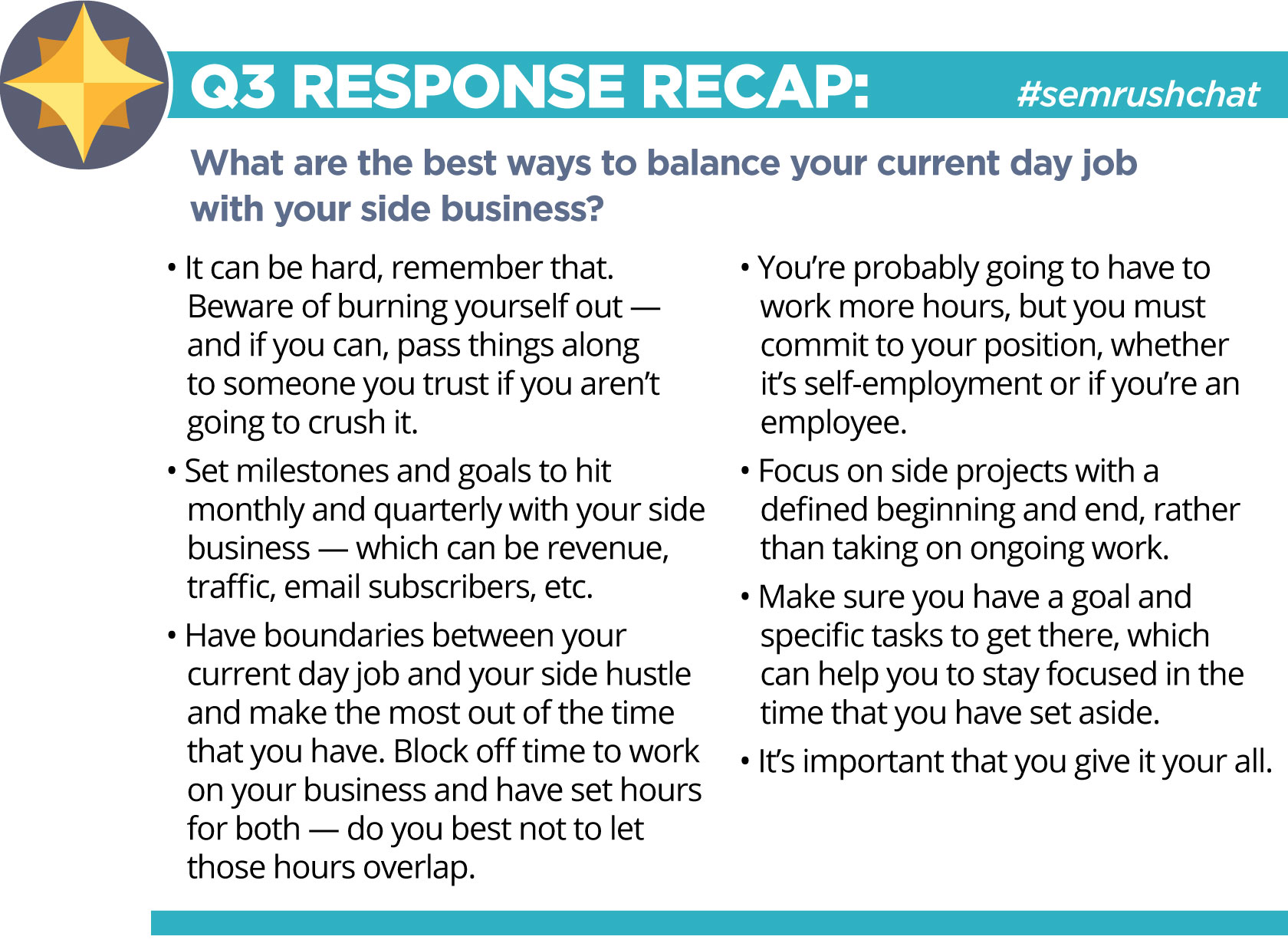
Q4. What is the scariest thing about becoming self-employed that holds most people back?
Self-employment comes with a lot of potential risks. There is no point in denying that, but some of the best parts of life come with tremendous risk. So, what is the scariest thing that holds people back, and how can they overcome it?
Surprisingly, being afraid of the unknown was one of the most commonly discussed fears amongst our chat participants. What will I do? How will I make it work? How will I even get started? How will I be different from competitors? What challenges will I face? Will I actually be able to make money? What if it doesn’t work? What if this means change? The fear of the unknown coupled with the fear of failure was a powerful one, especially since your own income and financial security can be at risk.
[A4] Most of my friends who are scared to step into working for themselves are scared of the unknown. How will I get clients? How much do I charge? What about taxes? What about benefits? #semrushchat
— John Doherty ? (@dohertyjf) January 3, 2018
[A4] To wrap this question up, I think most are scared because they don't know what they don't know. They don't get started. So set aside a few hours a week to get started and allow that to keep pushing you forward. #semrushchat
— John Doherty ? (@dohertyjf) January 3, 2018
A4) It's definitely the fear of failure for many people and of course, there are often minimum income levels one must meet from the get-go (mortgage, family, etc). That holds many people back who could achieve much more #SEMrushchat
— Dawn Anderson (@dawnieando) January 3, 2018
A4 fear of unintended consequences. You're afraid of all the things you don't know. It's sort of like the fear of falling. You are really afraid of landing - hard. #SEMrushchat
— JMisReadyForSpring (@JoMarieT) January 3, 2018
A4: No "guaranteed" income and all the responsibility in the world. The funny thing is, you already have that when you're an employee, too. You just don't realize it. #semrushchat
— Kevin_Indig (@Kevin_Indig) January 3, 2018
A4: I think for a lot of people the fear is the unknown -- Will I make money (get paid) every month? What if it doesn't work out? Is this sustainable long-term? #semrushchat https://t.co/CEKrnsrfND
— ThinkSEM (@ThinkSEM) January 3, 2018
A4: The unknown. You aren't sure where to really get started with your idea, where money will come from, etc. #semrushchat
— Netvantage Marketing (@netvantage) January 3, 2018
A4: There's a fear of failure, plus it's risky financially. Many people worry that things won't work out, but if you don't try... You'll never know. #semrushchat
— Express Writers (@ExpWriters) January 3, 2018
A4 Will it work? Will I make enough money? Will I survive? Will I enjoy it? Will my partner not leave me because I spend all my time doing it? Will I be happy?!? #semrushchat https://t.co/v70olSg7eL
— Hilary St Jonn (@HilaryStJonn) January 3, 2018
Self-doubt (which can take the form of imposter syndrome) was also a powerful hindrance, with many people worrying about not knowing what they didn’t know. They felt they didn’t know enough to get started, and they weren’t sure where to look. There is so much involved with running a business-- including deciding how much to charge, how to prepare taxes, and how to mitigate those lost benefits-- that it can feel like there is just too much to know, and that they are frauds because they don’t know it yet.
A4 - imposter syndrome of course. I still have it. #SEMRushChat
— Simon Cox (@simoncox) January 3, 2018
A4. The scariest thing about becoming self-employed is overcoming self-doubt #semrushchat pic.twitter.com/V9I2DodLjx
— AJ Ghergich (@SEO) January 3, 2018
A4. So, so many things.
Not getting paid (ever, or on time). Impostor syndrome (why would someone pay *me* to do this) Paying for things I take for granted (pension, time off, sick days) Paying for things I didn't even know I need (liability insurance) etc. #semrushchat
— Ⓞⓟⓣⓘⓜⓘⓢⓔⓨ (@Optimisey) January 3, 2018
If you ever feel like this, remember that everyone with a six or seven figure business felt like this at some point, and they were able to figure it out- you can, too. Set aside a few hours a week to get started, even if you don’t feel like you are ready. Once you get started, you will feel the motivation to keep pushing forward until you have something very real, even in the face of people who feel the need to doubt you and tell you it is not possible.
[A4] The fears are possible to overcome, otherwise no one would work for themselves! Find a mentor who has built businesses before and do a ton of internet research. Then, get started with learning how to get new clients and what to charge. It's all very learnable! #semrushchat
— John Doherty ? (@dohertyjf) January 3, 2018
A4) BTW, don't forget the crab mentality people who will try to hold you back, hold back your progress, put you down, https://t.co/739niLBDwW. There are even quite a few in the SEO world around us you might spot from time to time #SEMrushchat
— Dawn Anderson (@dawnieando) January 3, 2018
a4 The security of working for someone else, paid time off, sick time, 401K's, leaving work at 5pm, etc. #semrushchat
— Debi Norton (@BRAVOMedia1) January 3, 2018
Don’t worry about scaling from the beginning, and worrying about having people’s livelihoods in your hand. Instead, focus on the potential of what you dream of building, and find ways to do just that. Instead of thinking “I’ll do it tomorrow,” commit to starting right now, or the decision to do so may never actually come since it is hard for us to ever feel truly ready.
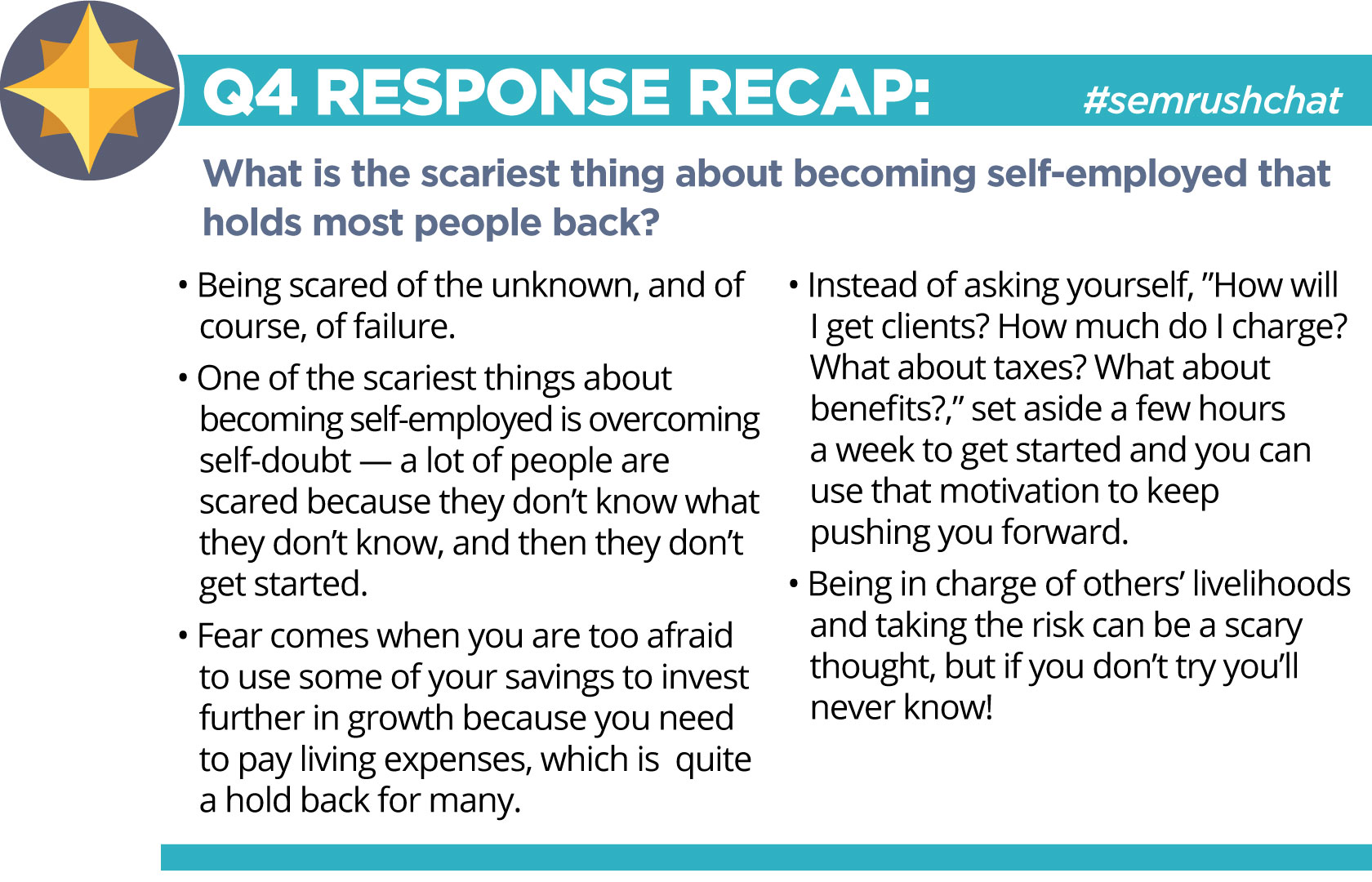
Q5. What tips would you give to a failed entrepreneur to guarantee success?
Sometimes, even the most successful entrepreneurs don’t go skyrocketing to six or seven figures on their first go, and instead, end up stumbling and losing a business. One failure doesn’t mean that you are automatically out of the race, though, unless you let it.
Need another reminder? Consider these successful entrepreneurs who had to fail several times before they succeeded:
JK Rowling, who was broke and depressed, was rejected by multiple publishers before one said yes to publishing Harry Potter
Walt Disney was fired from Kansas City Star because his boss thought that he lacked creativity
Oprah Winfrey was fired from her first TV position as a news anchor
Henry Ford had multiple failed businesses that left him broke five different times before he started Ford Motor Company
Moral of the story here: failure isn’t permanent, and as one of our chat participants said, it is only a failure if you make it one instead of learning from it. All failures give us the chance to learn something new, allowing us to grow and do better next time. Trial and error is a part of growing a business, and sometimes you really need to learn from the errors to avoid them the next time around.
A5 1: Try, fail, learn, try, fail, learn... until you learn enough to succeed. No one gets it from the first time, unless they are very lucky, but they most definitely don't get lucky twice. #semrushchat
— Youness Bermime (@YounessBermime) January 3, 2018
A5 no guarantees in life. But knowing when to stop something that isn’t working is important. However just b/c one project failed doesn’t mean the next one will. And if you make strategical moves instead of leaps as @dohertyjf suggests, u r more likely to succeed. #semrushchat
— Hilary St Jonn (@HilaryStJonn) January 3, 2018
That being said, maybe don’t rush right back the thick of things after one failed business. Take some time away to decompress and then, with a more level gaze, take a look at why your business failed. Hold yourself accountable, and know how you’d do it differently the next time.
[A5] First, if you are able you should take a bit of time away before you start another business. Take this time to decompress, and then look at why your business failed. You'll only succeed by realizing where you went wrong before and correcting that next time. #semrushchat
— John Doherty ? (@dohertyjf) January 3, 2018
During this process, surround yourself with great people. Hire a great team of support staff if you need it, or find mentors, or join a networking group with other entrepreneurs who genuinely want to see you succeed. They will be able to provide unparalleled support and advice to help you grow and overcome the obstacles you struggled with before.
Moving forward, remember to set SMART goals. These goals are specific, measurable, achievable, relevant, and time-bound. Take your past mistakes into consideration when setting them, and use these goals to evaluate your progress moving forward. And remember, everyone fails at some point. We all fall down because nothing in life is guaranteed. Treat it as a learning experience, and pick yourself back up. Failure is not the end of the world if unless you let it be.
A5: There's a German proverb: nothing in life's guaranteed but taxes and death ;-). However, there's also the saying "if you learn from failure you never fail". #sodeep #semrushchat
— Kevin_Indig (@Kevin_Indig) January 3, 2018
[A5] I think "guarantee" is too strong of a word, because nothing is guaranteed (except death and taxes). But, I think there are ways to have a higher chance of success next time.... #semrushchat
— John Doherty ? (@dohertyjf) January 3, 2018
A5 And there is no guarantee of success. Get that idea out of your idea right now. Build for the love of building. The only guarantees in life are death and taxes. #semrushchat
— Eric (@KantJungRand) January 3, 2018
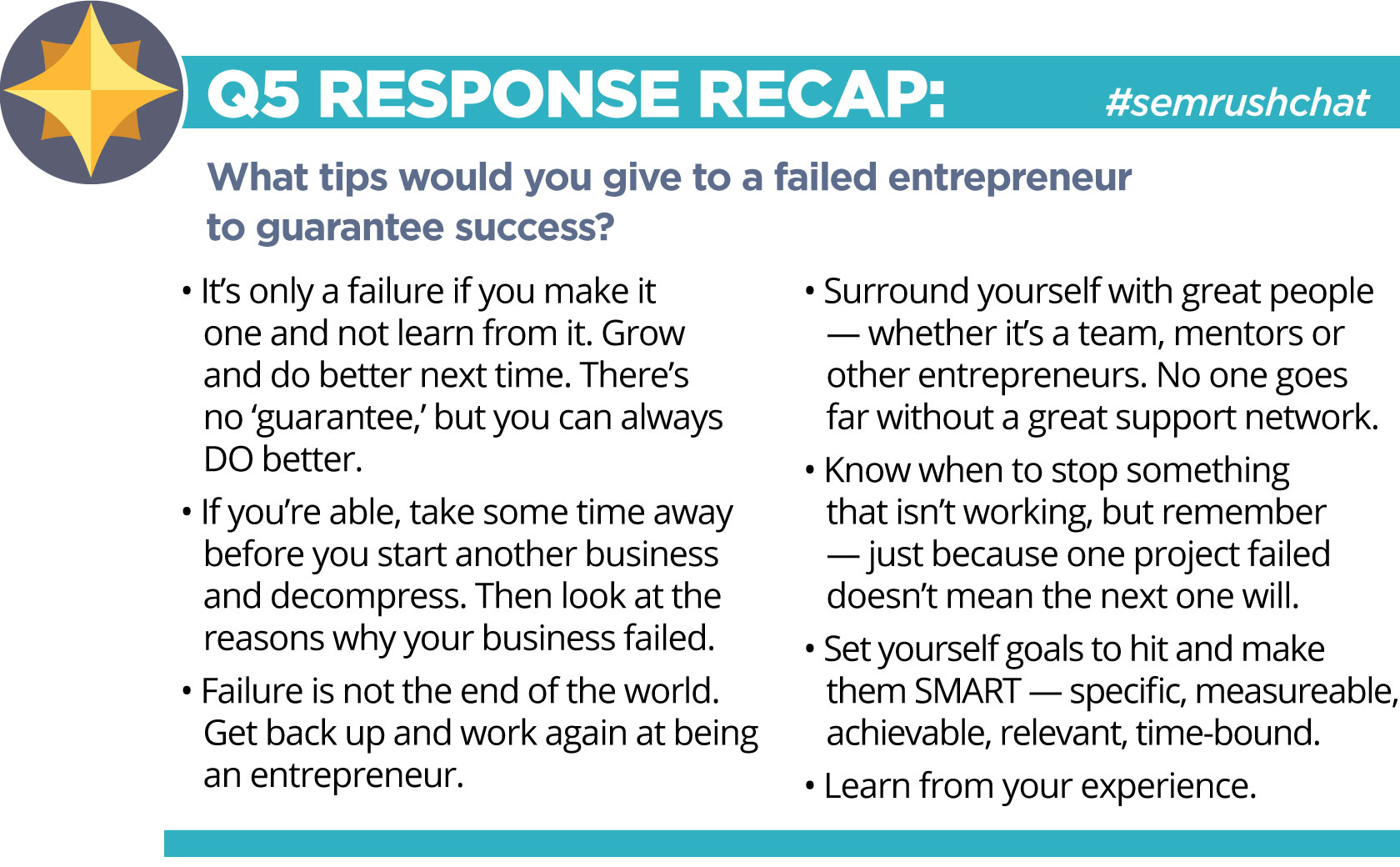
That's all for today! Make sure you join us this week on #SEMrushchat with Alexander Kesler as we discuss "Combining SEO and CRO to drive engagement!"
Innovative SEO services
SEO is a patience game; no secret there. We`ll work with you to develop a Search strategy focused on producing increased traffic rankings in as early as 3-months.
A proven Allinclusive. SEO services for measuring, executing, and optimizing for Search Engine success. We say what we do and do what we say.
Our company as Semrush Agency Partner has designed a search engine optimization service that is both ethical and result-driven. We use the latest tools, strategies, and trends to help you move up in the search engines for the right keywords to get noticed by the right audience.
Today, you can schedule a Discovery call with us about your company needs.
Source:





